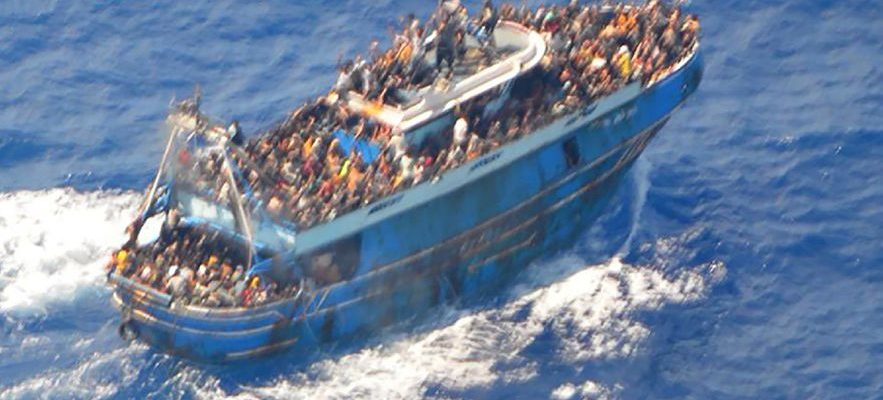Hundreds of women, children, and men have disappeared in the Calypso ocean trench, an abyssal trench of 5000 meters, the deepest in the Mediterranean. There is no longer any hope of finding survivors of the sinking of a ship that left Libya, which occurred 47 miles off the Peloponnese, in southwestern Greece, on June 14. Only 80 bodies were recovered and around a hundred survivors were found out of the 700 passengers from Syria, Egypt and Pakistan wanting to join the European Union.
A fortification strategy in question
Gateway to Europe for many exiles, Greece was used to the arrival of zodiacs from neighboring Turkey, on its east coast. Less to overloaded freighters from Libya, on its west coast. The European agency Frontex and the Greek coastguards are implicated by several investigations by local media. The latter had spotted the boat several hours before the tragedy.
This shipwreck hits Greece as the legislative elections to be held on Sunday June 25 approach. The migration policy of the right, and of Prime Minister Kyriakos Mitsotakis, is at the center of the debates. “Today there is a feeling of powerlessness, we do not trust Greek politicians to prevent these tragedies, says Kostas Tsoronis, a chemist living in the Peloponnese. New Democracy [NDLR : le parti au pouvoir] manages the problem by closing the borders, pushing back the refugees.”
The right indeed assumes a strategy of fortification of the Greek-Turkish border, with anti-migrant walls and reinforcement of the police force. The Greek coastguards are regularly accused of “push-backs” – illegal – of exiles in the Aegean Sea, to Turkey. Survivors of the sinking of June 14 accuse them of having wanted to push the fishing vessel back to Italy before the tragedy.
Image released by the Greek Coast Guard on June 14, 2023 of an aerial view taken from a rescue helicopter of a migrant boat off the Peloponnese peninsula on June 13, 2023
© / afp.com/-
“The strategy of the Greek government is only part of the problem. The main policy to blame is that of the European Union, which decides everything above, continues Kostas Tsoronis. The policy of the Union is to try to pass on refugees, from one country to another. One wonders if the EU still exists, since there is no common policy.” His anti-EU sentiment is shared in Greece. The day after the sinking, demonstrations brought together several thousand people in Athens and the Peloponnese. On the banners, one could read “Coastguards, Frontex, assassins”, pointing to the responsibility of Greece as of Brussels in this tragedy.
What impact on legislation?
According to Seraphim Seferiades, professor of political sociology at the Panteion University of Athens, “despite the emotion it arouses, the tragic sinking did not have the effect that it should have had on the electoral campaign: the fundamental debate, namely what policy the EU should put in place, has not been dug by politicians. Citizens are disenchanted with politics in general, demobilized and disappointed with the debate.” In the last legislative elections in May, 39% of Greeks abstained, he underlines.
“This sinking will have no impact on Sunday’s votes,” said Angelos Chatsiagelis, olive oil producer, also based in the Peloponnese. The Greek press, mostly pro-government, relieves him of all responsibility, which ends up permeating people’s minds.” A criticism also formulated by the opposition.
“There is a current hostile to refugees in Greece which unfortunately remains in the majority, admits Theodoros Zeis, a lawyer in Athens, who regularly defends migrants. New Democracy and the European authorities clear themselves of all these tragedies by systematically accusing the smugglers, and by asserting that the latter themselves create the migrations. This is false: migration exists without this traffic.” The lawyer regrets that the only image of migration conveyed is “that of misery and distress or of massive invasion. There is another reality: stories of integration, economic opportunities that are not talked about enough. “
For him, “the only solution to avoid shipwrecks is to organize these migrations”. A position favorable to “legal means” put forward by the left-wing party Syriza during the campaign. “The more we strengthen legal and safe routes, the more we upgrade the role of the EU and our cooperation on migration with Mediterranean third countries, the weaker the networks of smugglers will be”, thus called Alexis Tsipras, leader of the party. leftist and former Prime Minister, from 2015 to 2019.
“We follow a different policy (Editor’s note: from the left), fair and strict, of surveillance of our borders: it has led to a 90% drop in illegal crossings”, for his part assured the leader of the right, Kyriakos Mitsotakis . In April, in the first days of his election campaign, the Prime Minister went to the Evros region, on the land border with Turkey, to announce the extension of an anti-migrant wall, financed by Athens. “We contribute to European security and we also contribute to a more effective European asylum policy,” he argued. It was a few weeks before the sinking.
